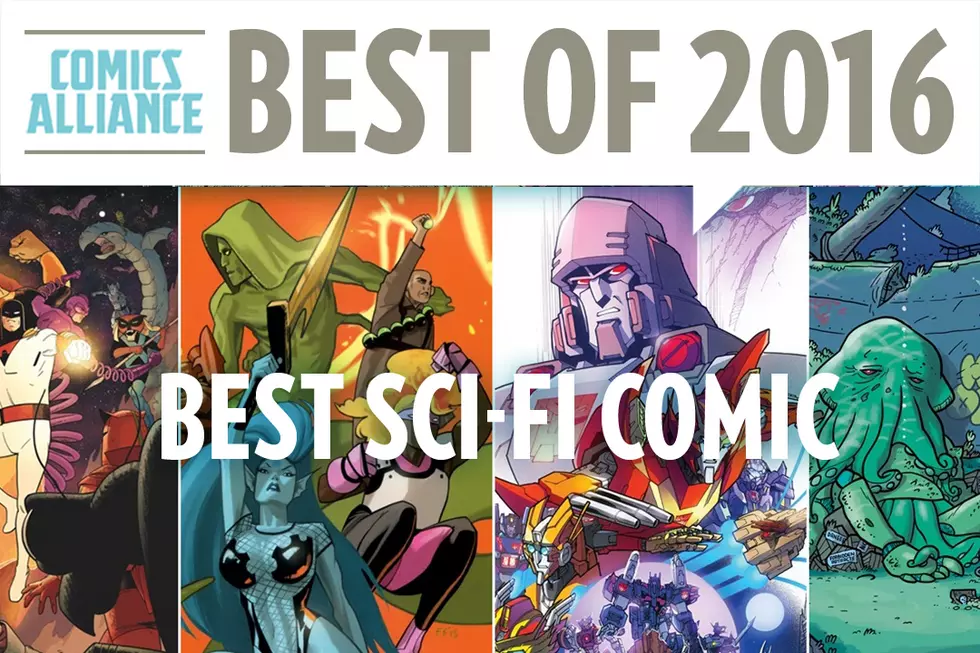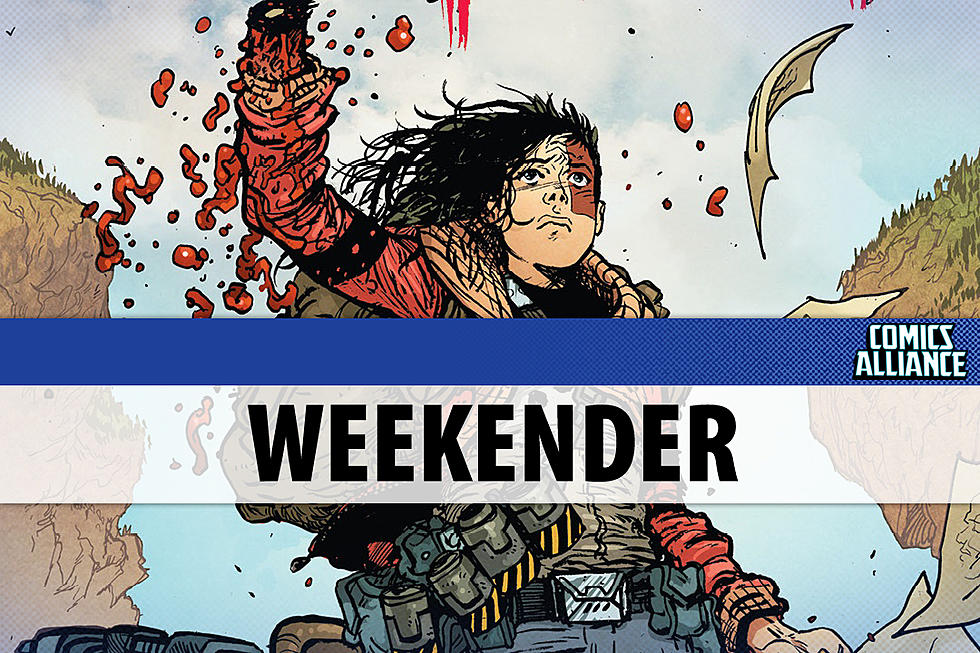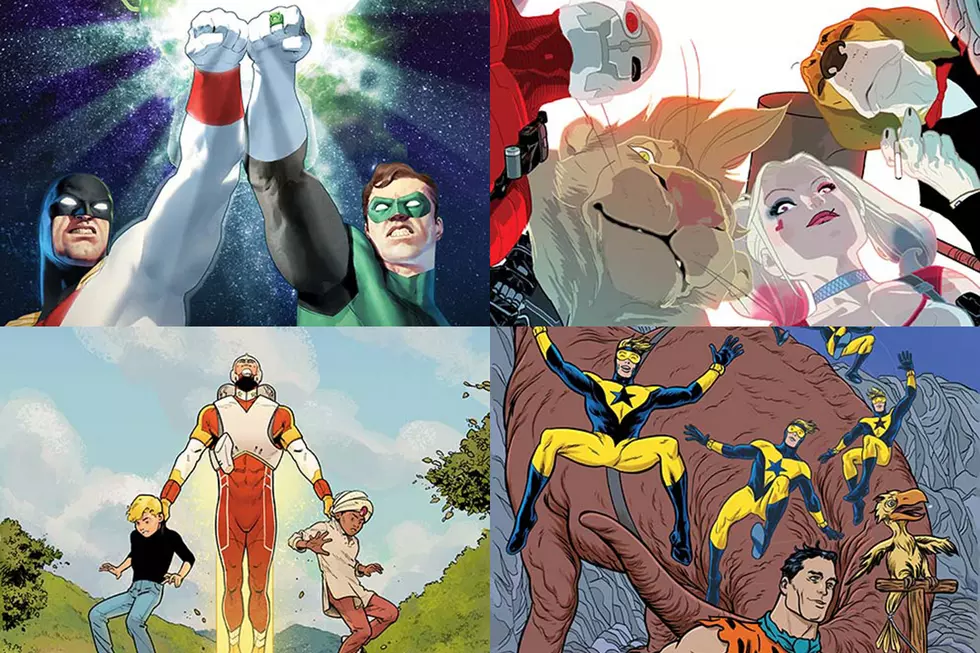
Thought Bubble #1: Why Aren’t Comics Funnier?

The comics medium attempts to answer a lot of big questions: Is it right to take the law into your own hands? What would someone do with special powers, given the opportunity? "Are you ready for the world that's coming?" In that spirit, ComicsAlliance's Matt Wilson is asking comics creators, retailers and commentators some big questions of his own.
In this installment, Roger Langridge, Jim Rugg, Michael Kupperman, Jeff Parker, Benito Cereno and Aaron from Awesomed By Comics answer the question: Why aren't more comics, particularly comics from major publishers, funny?
On this week's War Rocket Ajax, ComicsAlliance Senior Editor Andy Khouri joined co-host Chris Sims and I to discuss DC Co-Publisher Dan DiDio's list of his top 10 comics projects of his first decade with the company. We found that every item on the list was somewhat lacking in the area of humor. So I broached the topic with some folks familiar with a funny comic or two. They're called "comics," after all. Here's what they had to say.
 Roger Langridge (Snarked!, Boom Stuidios' Muppets comics, IDW's Popeye):
Roger Langridge (Snarked!, Boom Stuidios' Muppets comics, IDW's Popeye):
I think a large part of the absence of funny comics from the Big Two [DC and Marvel] comes down to the fact that your average superhero reader is living in a kind of denial about the inherent ridiculousness of a character who wears his underpants outside his trousers and punches people called "The Riddler" for a living. I don't think there's a whole lot more to it than that. They want to believe their reading matter is "serious," and they make the adolescent mistake of equating "seriousness" with "humorlessness," which is not the same thing at all. Marvel and DC pander to this misconception.
There are plenty of funny comics around, though. You just have to get out of the superhero nursery to find them.
 Jim Rugg (Afrodisiac, Street Angel):
Jim Rugg (Afrodisiac, Street Angel):
I'm actually terrible at these kinds of questions. I start to break the question down and then I think I usually lose the intent of the questioner at some point. For instance, by "major publishers," do you mean Marvel/DC? They aren't "funny" because "funny" isn't what TimeWarner and Disney believe will optimize the value of their intellectual property portfolios for licensing. If by "major publishers" you mean everything found in Previews [the Diamond Distributor catalogue from which retailers purchase new comics] -- I think you could ask why most sitcoms, rom-coms, stand-ups, and Sandler movies aren't funny and come up with a similar answer. Comedy is subjective. That subjectivity makes is a difficult genre in which to succeed. While my work may have made you laugh, it's also fallen flat to many others.
So then, I wonder, is your question about intent or success? Why aren't there more comics that are funny or why aren't there more comics that would be classified as "comedy?" I think there are a lot of funny comics -- Michael Kupperman, Julia Wertz, Johnny Ryan, and subversively funny stuff like Jim Woodring, Ben Marra, Ted May, Michael DeForge... combined with reprints and imported work, I think there's actually quite a lot of funny comics that run a wide gamut of styles. Perhaps fandom, specifically comic book sites that focus on the direct market, don't focus as much coverage on funny comics so it creates the impression that there aren't a lot of funny comics being published. See, I told you I'm terrible at these kinds of questions.
There's also an issue of what is funny in comics is not an exact equivalent to what is funny in video (like movies and TV). For instance, funny drawing is found in a lot of comics that are influenced by newspaper strips and/or underground comics, but the content of the stories may be less obviously comedy, so then it creates tension between subject matter and form that can confuse a reader as to whether to laugh or cringe...and that comes back to the subjective thing.
 Michael Kupperman (Tales Designed to Thrizzle):
Michael Kupperman (Tales Designed to Thrizzle):
Humor is unpopular in comics in two directions. There's no demand for it among readers, apart from a few eccentrics. Most people who read comics today either do it to fantasize or to receive some kind of enlightening experience. They don't like humor in comics because usually, let's face it, it's been awful. And then publishers don't like it either, partly because they want to feel they're contributing meaningful comics to the marketplace, as good as books or movies, and partly because marketing people find humor a very tough sell, since they don't understand it. No marketing person has a sense of humor (although a few think they do).
There's also just the fact that these are anxious times and people find humor a little threatening. Even Woody Allen has turned against laughter... People want meaning, they want escape. Humor makes them uncomfortable.
 Brian Clevinger (Atomic Robo):
Brian Clevinger (Atomic Robo):
Y'know, there are a lot of funny moments in corporate comics. This is by no means a comprehensive list, but by way of example: all of [Mark] Waid's comics have humor. [Matt] Fraction's best stuff has a smile to it. [Jonathan] Hickman, [Jason] Aaron, [Rick] Remender, [Fred] Van Lente. These guys make corporate comics with jokes in them. And they are far from the only ones.
I was hired by Marvel because of my work on Atomic Robo, widely considered a humor book -- it is, but only insofar as Indiana Jones is a comedy. And then everything I wrote for Marvel was a series of jokes. Some of them so absurd they were daring the editor to either remove them or to never hire me again.
Yet no one ever suggested I tone down the humor and I still get hired. (Not often enough though. Call me.)
So, there's no lack of will on the side of creating or publishing. You don't get into this business unless you love the medium, and part of loving it is shoving crazy ideas together and laughing because you can't decide if it's the best or stupidest thing you've done.
But every Funny Page is an Unimportant Page.
And Importance is what the majority of corporate comics readers today are buying. So Humor, as a subset of Fun, takes a backseat. I just think, maybe, all this emphasis on Importance is kinda silly. Especially when whatever is so Important right now gets ignored or undone for something EVEN MORE IMPORTANT THAN THAT within a year. Maybe that's why the audience for Importance is shrinking? The industry devalues its own unique resource even as it hawks its worth. They had to create laws to stop cigarette companies from advertising to children to replace their dead customers. Sometimes it feels like comics doesn't even try.
I dunno. Let's just tell some fun stories. It works for the movies.
 Benito Cereno (The Tick, Hector Plasm):
Benito Cereno (The Tick, Hector Plasm):
I'm not sure it's entirely accurate to say that modern comics -- even the most mainstream of comics -- are not funny. Certainly many -- maybe even most -- comics have jokes in them. I see threads on various comics message boards dedicated to posting the funniest panels from each week's new comics, and every day these threads are updated with panels of So-and-So getting off a pretty good zinger after his teammate has murdered someone, or Some Other Guy dropping a decent one-liner as he swoops off to sexually assault a sea monster or whatever. People are getting laughs from their comics is what I'm saying.
What's missing, really, is a sense of whimsy, or at least a sense that the next thing that happens is not going to be horrible. But it's not hard to see why that is: Comics today sell themselves on a relentless sense of dread. Why would I want to buy the next issue if I know everything is going to be okay? Because it's fun and I enjoy myself? Shut up, grandpa.
Comic storylines are based on getting you to believe they're "important;" you have to have them or you're missing something. And the important things in comics--deaths, divorces, mutilations, spousal abuse, etc.--tend not to be funny (or at least they are pretty context sensitive in that regard).
 Jeff Parker (Hulk, Dark Avengers, Bucko):
Jeff Parker (Hulk, Dark Avengers, Bucko):
There are so many deadly serious comics because most of the people making these books... got no funny in them. Humorless people can bumble their way through drama by seeming very serious, but you can't fake funny. Anyone who has an aptitude for humor, uses it. Why wouldn't you? It can play off horror and tension brilliantly. It can make a book highly entertaining, which I think is the point of doing it. And here I'm talking about books that aren't primarily humor, but can use it to vary the work, keep it from being one-note throughout.
As for pure humor comics, there's just not that many people working now who can pull them off. Roger Langridge can give you 22 pages of real laughs, and is interested in doing so. Evan Dorkin will guarantee hilarity. Not many other creators seem to want to, or they suspect they can't make a living doing it. Sadly, it's probably the latter. Apparently the readerships' lives are so mind-blowingly fun and awesome that what they need for escapism is dour rapey gorefests and no one wants to feel better after reading a comic. More likely, those books reinforce a self-perception that wants to feel all hardcore and edgy, and definitely not juvenile. Though most of the nation will gladly turn out for a comedy movie.
Speaking of which, Peter Bagge's Reset feels much like the kind of comedy film that would do well in the greater world, and you should seek it out. It's exactly the kind of book there should be way more of.
 Aaron from the Awesomed By Comics Podcast:
Aaron from the Awesomed By Comics Podcast:
There's a bunch of overlapping issues at play here, none of which are solely responsible for the dearth of true humor in mainstream (Big Two especially) comics.
Here's my theory about what you'd find, if you looked into the comics world's collective brain. From the 1930s through the early 1980s, the vast majority of mainstream comics were aimed at boys, probably ages 8-12. In the mid 1980s creators started making comics that could be appreciated on another level by the adults who had grown up reading comics. But adults didn't buy comics for themselves regularly. So the industry thought -- why not skew a little older than 9-12, so that our audience will have more disposable income but not any actual responsibility to pay for things like food and rent? In the late 1980s through the mid-to-late 1990s comics began being aimed at boys ages 13-17. There's a problem with boys ages 13-17. (Many problems, actually. Boys ages 13-17 are, with a handful of exceptions, pretty much walking sacks of problems. But one in particular has led to the issue we're talking about today.)
Teenagers have a deep-rooted psychological need to socially reject anything that would be associated with childhood. Funny comics are for kids, man. These ain't yer kids comics, man. These comics are all about gritted teeth, man. These have muscles and guns and muscle guns and tits and tit muscles and guns that shoot tits. There's another problem that enters into play here, which is that this was around the time the industry started to believe that comics don't need true writers. Comedy, however, absolutely does.
So the late '90s and early 2000s came, and we saw a handful of comics that skewed even older hit the mainstream, aimed at those 13-17 year olds who were now 17-21 (Authority, X-Statix, etc.) But most of the comics were still being thrown at the 13-17 year-olds. And then we hit what's known as a feedback loop. The kids who had read those tit muscle gun comics in the '90s started making comics. (And the guys who made them the first time never really left.) Now comics aren't funny because the people who make comics now grew up thinking comics aren't funny.
And this gets us to another problem. Right now, there are So. Many. F***ing. Comics. When you're publishing two times as many books as you have legit stories to tell, then you need other reasons for people to buy your books. You need collectors. You need people who take this industry so seriously that they cannot miss an issue, and they will not drop a title even if it takes six issues and a spinoff to tell a story that could have been told in six pages and a recap. These people? They take this s**t seriously. If I were to play amateur therapist, I could say something like, "These are social outcasts who never felt like they were taken seriously in their formative years and now they are overcompensating blah blah blah tell me about your childhood that'll be $175 please."
Which segues nicely to another problem... money. This is an industry where sales are determined by retail pre-orders, not by end-users. And it's an industry that doesn't take advantage of its many critics (in the neutral sense of the word) before those orders have to be placed. So the retailers decide what sells. And guess when the vast majority of those retailers came into being? Yup. Titguns. So what do you think they think sells? Yup again.
I don't know why more comics aren't as funny as Marvel Adventures: Spider-Man was, or Empowered is, or don't use humor in their books to break tension as well as [Gail] Simone did in [Secret Six] or [Jeff] Parker in Thunderbolts, or the way [Kieron] Gillen uses Namor in Uncanny X-Men. I don't know why [Brian Michael] Bendis is a million times funnier with Ultimate Spider-Man than he is with Avengers, I don't know why stores don't tell customers to buy books that are excellent even if they seem to be aimed young, nor do I know why so many readers seem to have such awful taste, subjectively speaking, obviously.
Thanks to everyone for their thoughtful contributions. And now we put the same question to ComicsAlliance readers. Why do you think comics aren't funnier?
More From ComicsAlliance
![I’m A Maniac For Flavour! ‘All-Time Comics’ Taps Into Old-Time Ad Nostalgia [Exclusive]](http://townsquare.media/site/622/files/2017/03/atcads_featured1.jpg?w=980&q=75)
![’70s Gotham (And ’70s Nightwing) Come To Life In ‘Batman ’66 Meets Wonder Woman ’77’ [Exclusive Preview]](http://townsquare.media/site/622/files/2017/03/BM66MWW77-feat.jpg?w=980&q=75)

![Friendly, Wholesome, And Tough: David Hahn And Karl Kesel On The Art Of ‘Batman ’66 Meets Wonder Woman ’77’ [Interview / Preview]](http://townsquare.media/site/622/files/2017/01/B66a.jpg?w=980&q=75)





